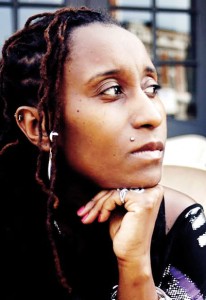Enjoying writing, telling stories that were not told

Pic courtesy britishcouncil org
“If you see the way they does hold on to rum bottles like is com-
munion. Like is holy. Like is they saviour. The way they does crawl
all up inside hard liquor. Girl, if you see them wring out Johnny
Walker bottle. Squeeze in every drop. Knock back wray and nephew
just like real beast riding they soul.”
(An extract off ‘Sweet Liquor’, by Malika Booker)
“To read your work and to hear people relate to it is quite humbling and refreshing. To know that you’re in conversation with them, and they’re feeling that you’re talking about their lives are the rewards and that’s the happiness from it,” Malika Booker explains.
We find the poet, playwright and performer, amidst a group of children at the Thomas Gall School early on Sunday (January 15) morning, the last day of the Fairway Galle Literary Festival where she is wrapping up a workshop on ‘Mapping our world for memories’. Their playful banter the poet handles with the utmost care and respect.
Her work is rhythmic poetry, which is inspired by the Caribbean intergenerational conversations. It is autobiographical; she describes it as trying to fill in the gaps and erases in some of our histories. “It’s very storytelling, very complex but still easily available to different types of generations because of the fact that it’s conversational,” she says. People can relate to it because it might seem like things that your mum would have said or conversations that you would’ve had while going somewhere with your aunt etc. “So it’s very every day.”
Every day it may be but it has earned Malika numerous international residencies. She is a Fellow of both The Complete Works and Cave Canem. She was the inaugural Poet in residence at the Royal Shakespeare Company and is founder of ‘Malika’s Poetry Kitchen’, a writer’s collective for beginning and emerging poets. Her collection of poetry ‘Breadfruit’ (2007) was recommended by the Poetry Society and ‘Pepper Seed’ in 2013, was shortlisted in 2014 for the OCM Bocas Prize in Trinidad and also for the Seamus Heaney Centre Prize. She is currently a Douglas Caster Cultural Fellow in Creative Writing at the University of Leeds.
Malika has always been a reader and thought that she would be a novelist. Yet it was quite by accident that she realised she wanted to work in the arts. “I was doing anthropology and I was also writing and doing concert shows with this thing called poetry, when the realisation hit me and it took off from there,” she relates.
Malika draws inspiration from various sources. She is inspired by Sharon Olds, William Blake and various young poets. However what stands out is the long generations of Caribbean women, writers and poets who started putting Caribbean women’s history on to the page. “I think that’s made me feel a responsibility to always try and give a woman’s story, because all women’s stories have been obliterated through time, so I’m always inspired by them,” she says.
“You hear a fresh piece of work and you go ‘that is gorgeous’, it makes you want to go back and recreate that deliciousness. And everyday life, something that’s happened on the street in front of me, trying to capture it are all inspirational,” she adds.
“I am the ultimate diaspora child,” she relates, explaining that her mother was originally from Grenada, while her father was from Guyana. Her parents met in Britain, but after she was born, the family moved to Guyana. Her parents split up when she was eleven and Malika moved to Britain. Her mother went to Grenada with her brothers at the time and from there to New York.
“So my family is from different places and spaces of home and that’s kind of reflected in my work. So I grew up in Britain with my mum’s sister and her family, spending the holidays with my mum and having a kind of extended family to telephone in different countries,” she explains.
It has always been the beginning and the end parts of writing that Malika loves the most. When you have an idea in your head and it comes out on the page and you get it right, and everything else with it works, “to be able to think about something and create something and it exists and you’ve written a story that didn’t exist before and it speaks to people, that’s what I love,” she tells us.
Every writer starts with a question and the journey, is them trying to grapple with it and answer the question. In the end you might not solve the question, but you might come closer to having an understanding of, maybe, another way of life. This is because of the research one has to put in on the way someone else might feel. “So the empathy that’s needed in the work, helps you as a writer to be less judgmental about things and be open to different kinds of experiences,” she says. Sometimes you’re alien to something but you have to put yourself in their shoes, to be able to write and in doing that you understand a bit more about humanity.
She has really loved and enjoyed every bit of the FGLF she says. “I’ve discovered new writers, seen writers who I know and their performances, I’ve been to talks and been inspired. I went to a talk yesterday (Saturday 14) conducted by two Sri Lankans, who climbed Mount Everest. It was inspiring, to know that at the time they did this, all they had was the belief and hope in doing it,” she says.
The kids come back from their lunch and Malika looks at me, a smile on her face. “I really enjoy what I do; I enjoy being a writer, trying to write the landscape, trying to write the stories that weren’t told.”


